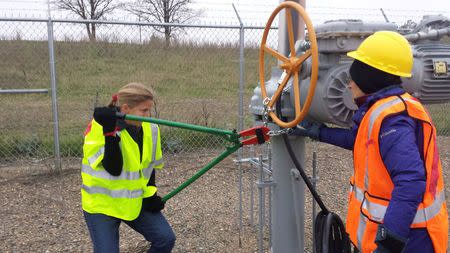Why Canadians are taking up the battle in Standing Rock against the Dakota Access pipeline

What is happening at the Standing Rock protest camp in North Dakota could easily be happening north of the border in the near future, says the president of the Union of British Columbia Indian Chiefs.
The protest against the multibillion-dollar pipeline has become an international focal point in the intertwined fight for Indigenous rights and climate action, says Grand Chief Stewart Philip, whose group represents 115 B.C. Aboriginal bands.
“The Standing Rock Sioux tribe is not standing alone,” Philip told Yahoo Canada News. “It’s all part of the same issue.”
Philip and his wife visited the protest camp on the Standing Rock Indian Reserve in September. The flag of the Union of British Columbia Indian Chiefs now flies over the Sioux camp, along with hundreds of others including the Maple Leaf, and he expects the same solidarity if Canadian First Nations have to take similar action to stop pipelines, he says.
This week, the union and at least 85 other Aboriginal groups signed onto an alliance that opposes any expansion of the Alberta oilsands or its infrastructure. That includes the Dakota Access Pipeline (DAPL) and other pipelines proposed in Canada.
“We are at a watershed moment in the history of the world,” Philip said. “We’re going to see that battle intensify.”

Last month, activists sabotaged the U.S. pipelines of several Canadian companies in a co-ordinated action they described as support for protesters at Standing Rock.
The members of the Climate Direct Action activist group targeted pipelines belonging to Enbridge, Spectra Energy, TransCanada and Kinder Morgan. There were arrests in Montana, Minnesota, Washington and North Dakota.
DAPL opponents are also calling for a boycott of several banks they say are involved in bankrolling the pipeline project, including Canadian banks RBC, TD Bank and Scotiabank.
Last weekend, several ATMs belonging to TD Bank were smashed with a hammer in Kingston, Ont., and marked with the words “No DAPL.”
The Council of Canadians sent earplugs to Standing Rock, for protesters to block the sound cannons being used by authorities to try and break up the camp.

There have been hundreds of arrests in several skirmishes between protesters and police as the stand-off drags on.
Mohawk people from Kahnawake are raising funds for the camp and have held their own actions in solidarity.
Thousands of Canadians have answered a call to “check-in” at Standing Rock on Facebook, purportedly to confuse police. In real life, there have been media reports of members of the Mohawk nation in Quebec, students from British Columbia and First Nations from Manitoba to Yellowknife making the journey to join the camp.
At least two Canadians, both graduate students at the University of Northern British Columbia, were among those arrested at Standing Rock last week.
The decision by Calgary-based Enbridge, proponent of the controversial Northern Gateway pipeline in B.C., to invest in the Dakota Access project helped galvanize opposition north of the border.
“Canada needs to hold Enbridge accountable not just here in Canada but also in how it’s investments in DAPL are used to support human rights violations against water and land protectors from our communities here north of the medicine line,” Derek Nepinak, grand chief of the Assembly of Manitoba Chiefs and a signatory to the alliance, wrote on his Facebook page.
Such companies, “would rather brutalize indigenous peoples than listen to them,” he said.
Happening right now in Toronto. Activists occupy @TD_Canada headquarters in solidarity with #StandingRock. #NoDAPL https://t.co/0vJqfiQTXb
— Andrea Houston (@dreahouston) November 3, 2016
Ottawa in Solidarity✊ #NoDAPL #StandingRock #WaterIsLife #Canada pic.twitter.com/2Ahiy7afQT
— Ubax Said (@UbaxSabieh) September 16, 2016
In Canada and around the world, Philip says Indigenous people have become the “thin red line” between corporate greed and the environment.
“Indigenous communities are well-positioned to be the vanguard of this struggle to save the planet,” he said.
Opposition to the oil industry has become intertwined with Indigenous land and title rights, he says.
The Union of B.C. Indian Chiefs unanimously passed a resolution supporting the Lakota and Dakota nations in Standing Rock.
Its approval, they say, is a violation of the treaty the U.S. federal government signed with the nations and the United Nations Declaration on the Rights of Indigenous Peoples.
“We are highly aware that the violence being perpetuated against your people and allies while you are defending your land and water, could also take place here if projects like the Kinder Morgan Pipeline expansion are approved,” says the resolution.
Aboriginal leaders will gather in Vancouver next month for a forum called “From Standing Rock to Burnaby Mountain: Can Direct Action Stop New Pipelines.”


